Nelson Lowhim's Blog, page 109
April 20, 2016
Art as Life
There's a decent article over
at the Guardian, about a gold toilet
. Though it's always good for people to look at art and compare it to whatever currents are swimming through the zeitgeist, I sense that the author's obsession with the gold and the oligarchs most likely to buy such items, runs a little on the click bait side of things. Well, that's going a bit too far, but the last section of the article, which points out that it's in humanity's nature to stare at the goods of the rich.
The other question is how much does it matter if the rest of us refuse to be in awe of these trophies? One would like to think that any social value it has would deflate the entire edifice. But our disdain probably helps inflate the price too. How? Because it keeps the peasants at bay and allows those in the art world to have their own language for their pieces. [3]
So the question is what is one to make of a gold toilet you can use? Is it something the oligarchs want to buy as states symbol? Do they already have it? And if so, what is the artist trying to say by showing it to the public? I'm certain it's a little more than just this is what the rich have. By merely showing it, it speaks to inequality, doesn't it? [4]
So perhaps then it's a great piece of art. [5]
[1] The main question is to ask who exactly is going to these art shows, and in general it's those attempting to emulate the selling of such pieces, or those in the middle classes who want to emulate those who buy such items. That, unfortunately, includes me on some level.
[2] I've mentioned street art more than a few times. And in many ways, even though this has been commercialized, it's still an art for everyone.
[3] This ambiguity is something that is prized in the art world and helps to define a piece of art. And if you're someone rich buying something, what those experts say matters more than what the masses say in return.
[4] That in of itself is another point. It could be by merely raising the question of a gold toilet the level of ambiguity has been achieved and the art is more sought after for that. If someone with less imagination like me were to make this, I would demand a wax sculpture of some poor person with a toilet scrub and a hand out next to it. But that's me. I thrive in the obvious.
[5] I won't even step into the minefield of if this gold toilet speaks to the innate human need to like that which is shiny. Or perhaps as a statement against gold-buggism. Good times. Good writing, huh? Share it via email, facebook, twitter, or one of the buttons below (or through some other method you prefer). Thank you! As always, here's the tip jar. Throw some change in there and help cover the costs of running this damn thing Donate Bitcoins
Donate Bitcoins 
The other question is how much does it matter if the rest of us refuse to be in awe of these trophies? One would like to think that any social value it has would deflate the entire edifice. But our disdain probably helps inflate the price too. How? Because it keeps the peasants at bay and allows those in the art world to have their own language for their pieces. [3]
So the question is what is one to make of a gold toilet you can use? Is it something the oligarchs want to buy as states symbol? Do they already have it? And if so, what is the artist trying to say by showing it to the public? I'm certain it's a little more than just this is what the rich have. By merely showing it, it speaks to inequality, doesn't it? [4]
So perhaps then it's a great piece of art. [5]
[1] The main question is to ask who exactly is going to these art shows, and in general it's those attempting to emulate the selling of such pieces, or those in the middle classes who want to emulate those who buy such items. That, unfortunately, includes me on some level.
[2] I've mentioned street art more than a few times. And in many ways, even though this has been commercialized, it's still an art for everyone.
[3] This ambiguity is something that is prized in the art world and helps to define a piece of art. And if you're someone rich buying something, what those experts say matters more than what the masses say in return.
[4] That in of itself is another point. It could be by merely raising the question of a gold toilet the level of ambiguity has been achieved and the art is more sought after for that. If someone with less imagination like me were to make this, I would demand a wax sculpture of some poor person with a toilet scrub and a hand out next to it. But that's me. I thrive in the obvious.
[5] I won't even step into the minefield of if this gold toilet speaks to the innate human need to like that which is shiny. Or perhaps as a statement against gold-buggism. Good times. Good writing, huh? Share it via email, facebook, twitter, or one of the buttons below (or through some other method you prefer). Thank you! As always, here's the tip jar. Throw some change in there and help cover the costs of running this damn thing
 Donate Bitcoins
Donate Bitcoins 
Published on April 20, 2016 10:56
April 18, 2016
Eye in the Sky and the State of Movies Created by Our Courtier Class
"Aching, nobly, to wade through the blood of savages." —James Baldwin
I had the unfortunate luck of having to go and see Eye in the Sky , an entertaining movie that fell short in many other, non-dramatic, respects. I shouldn't be so crass. It wasn't so unfortunate. It's always good to have a look at what people (and most critics) think of as a well thought out movie. It gives me a chance to hone my own disgust for such views.
As you can tell, I've been on a little bit of a roll lately, writing about people out there in the zeitgeist who annoy me with their, at best, suburban ideologies infecting the soundscape. This movie only adds to that noise. Touted as a movie that,
"asks us to judge the proper balance between liberty and security"
I was hoping that it would at least try to move away from the blatant propaganda we all too often see these days. [1] Yes, this includes the stuff coming out of the "center-left", which usually only rises to the level of lip-biting while continuing with the murder of darkies.
I should be kinder. On one level, this movie at least tries to ratchet up the tension. It does so in a myriad of ways, though in the end, even this plays into the hands of those who wage war for their own profit. When, I ask you, has there ever been presented an iota of evidence that we have ever taken such precautions in a drone strike? All available independent evidence points to that fact that we don't. Strikes aren't based on in-depth intel, but rather metadata. And the method of finding out who is killed afterward isn't meticulous either. It's merely a body count = enemies [2].
The rest of the movie is much the same. It frames the question of drone strikes as those who stand to benefit from it do: as if the only thing to consider are the immediate cost benefit analysis of one person killed now versus 100 later. [3] Again, if life were so simple we would have won this war, wouldn't we? But we haven't and those in charge keep filling us up with fear so that we can open our wallets to more of the same. [4]
It doesn't stop there, the movie plays to the trope of our dear leaders all so concerned over the life of one darkie far away from home. Crocodile tears, these [5]. Yet in the film we're made to believe that every drone strike is a matter of stress upon these dear caretakers of ours. Right.
The less said about the entire premise of the film, the better. Essentially ignoring the vast majority of drone strikes, the film decides to pick a scenario that has yet to happen (that we know of, of course) and raise questions that don't matter to this entire war. To say nothing of using it to minimize real moral quandaries and only look at drones in a way that flatters those in charge.
Adding to my disgust, the only time there is an argument against using drones is when one "brave " [6] soul questions some legal aspect of killing via a drone strike, or mentions that this could be used as propaganda against them. Oh, poor protectors of the realm, if only people weren't so irrational.
That this counts as a deep film to our media is not a surprise. But I sometimes wonder if they actually think of such movies as deep reflections on the matter at hand. Even in the world of literature, the few books I've read from the center left seem to at best merely pause for some sad reflection before marching forward all crusade-like. Times like these I wonder if I'm missing something. But I'm not. It's the same thing over and over. And at the end of the movie we even get some chest-thumping
"Don't ever tell a soldier that he doesn't know the cost of war"
from our general to the one voice against the attack [7] as if to say, those soft-headed bleeding hearts, what do they know about this rational cost-analysis? (I would refer the general to the Baldwin quote)
And even my favorite magazine, the LRB, had a puff piece on drones. This piece went about slaying so many straw men, that it almost had me fooled . So why does our courtier class find it so necessary to create odes and excuses for those in power? As Orwell said, they love power and find a need to side with it rather than the facts. It's just sad to see it paraded as serious.
I take back my initial statement. This is very much like Triumph of the Will, but for a new age where the movie expects their audience to be a little smarter than your average TV watcher and thus a few seconds of serious reflection are called for. Go ahead and watch it, if only for a master class in subtle propaganda.
Update: Let me add a couple notes. As a friend of mine said, the movie, unlike many others, did try to portray the collateral damage as a whole, innocent, person and not some faceless victim (or not a victim at all). That should be mentioned and it's a step ahead of what most movies portray. Second, the portrait of the insurgents in the end showed at least a little bit of humanity. Something that's also missing from many other movies.
That being said, the amount of people who think of this movie as worthwhile is high. Look here .
[1] None of this rises to the level of Triumph of the Will , but that's only because it's smarter than that.
[2] Only those proven to be anything else are not considered militants, while those who are killed nearby are deemed guilty by proximity. Yup, that's our brilliant accounting on the matter.
[3] Let's not even look at how hypocritical this "surgical" view is. Such people would never want this logic applied to them, and for good reason. Again, suburban ideology at its best.
[4] Again, this is the wont to kill (sand)niggers as much as possible . I'm again reminded of James Baldwin's quote "Aching nobly to wade through the blood of savages". That genius really knew his fellow citizens, did he not?
[5] And there's not an iota of evidence for this. Our leaders care when we make them care. Period. Their disdain for the peace movement and any attempt at dialogue only proves those tears false.
[6] Portrayed here as the least caring of the lot. How fitting.
[7] all the other voices are portrayed as sniveling cowards, afraid of consequences and of making that decision.
Good writing, huh? Share it via email, facebook, twitter, or one of the buttons below (or through some other method you prefer). Thank you! As always, here's the tip jar. Throw some change in there and help cover the costs of running this damn thing Donate Bitcoins
Donate Bitcoins 
I had the unfortunate luck of having to go and see Eye in the Sky , an entertaining movie that fell short in many other, non-dramatic, respects. I shouldn't be so crass. It wasn't so unfortunate. It's always good to have a look at what people (and most critics) think of as a well thought out movie. It gives me a chance to hone my own disgust for such views.
As you can tell, I've been on a little bit of a roll lately, writing about people out there in the zeitgeist who annoy me with their, at best, suburban ideologies infecting the soundscape. This movie only adds to that noise. Touted as a movie that,
"asks us to judge the proper balance between liberty and security"
I was hoping that it would at least try to move away from the blatant propaganda we all too often see these days. [1] Yes, this includes the stuff coming out of the "center-left", which usually only rises to the level of lip-biting while continuing with the murder of darkies.
I should be kinder. On one level, this movie at least tries to ratchet up the tension. It does so in a myriad of ways, though in the end, even this plays into the hands of those who wage war for their own profit. When, I ask you, has there ever been presented an iota of evidence that we have ever taken such precautions in a drone strike? All available independent evidence points to that fact that we don't. Strikes aren't based on in-depth intel, but rather metadata. And the method of finding out who is killed afterward isn't meticulous either. It's merely a body count = enemies [2].
The rest of the movie is much the same. It frames the question of drone strikes as those who stand to benefit from it do: as if the only thing to consider are the immediate cost benefit analysis of one person killed now versus 100 later. [3] Again, if life were so simple we would have won this war, wouldn't we? But we haven't and those in charge keep filling us up with fear so that we can open our wallets to more of the same. [4]
It doesn't stop there, the movie plays to the trope of our dear leaders all so concerned over the life of one darkie far away from home. Crocodile tears, these [5]. Yet in the film we're made to believe that every drone strike is a matter of stress upon these dear caretakers of ours. Right.
The less said about the entire premise of the film, the better. Essentially ignoring the vast majority of drone strikes, the film decides to pick a scenario that has yet to happen (that we know of, of course) and raise questions that don't matter to this entire war. To say nothing of using it to minimize real moral quandaries and only look at drones in a way that flatters those in charge.
Adding to my disgust, the only time there is an argument against using drones is when one "brave " [6] soul questions some legal aspect of killing via a drone strike, or mentions that this could be used as propaganda against them. Oh, poor protectors of the realm, if only people weren't so irrational.
That this counts as a deep film to our media is not a surprise. But I sometimes wonder if they actually think of such movies as deep reflections on the matter at hand. Even in the world of literature, the few books I've read from the center left seem to at best merely pause for some sad reflection before marching forward all crusade-like. Times like these I wonder if I'm missing something. But I'm not. It's the same thing over and over. And at the end of the movie we even get some chest-thumping
"Don't ever tell a soldier that he doesn't know the cost of war"
from our general to the one voice against the attack [7] as if to say, those soft-headed bleeding hearts, what do they know about this rational cost-analysis? (I would refer the general to the Baldwin quote)
And even my favorite magazine, the LRB, had a puff piece on drones. This piece went about slaying so many straw men, that it almost had me fooled . So why does our courtier class find it so necessary to create odes and excuses for those in power? As Orwell said, they love power and find a need to side with it rather than the facts. It's just sad to see it paraded as serious.
I take back my initial statement. This is very much like Triumph of the Will, but for a new age where the movie expects their audience to be a little smarter than your average TV watcher and thus a few seconds of serious reflection are called for. Go ahead and watch it, if only for a master class in subtle propaganda.
Update: Let me add a couple notes. As a friend of mine said, the movie, unlike many others, did try to portray the collateral damage as a whole, innocent, person and not some faceless victim (or not a victim at all). That should be mentioned and it's a step ahead of what most movies portray. Second, the portrait of the insurgents in the end showed at least a little bit of humanity. Something that's also missing from many other movies.
That being said, the amount of people who think of this movie as worthwhile is high. Look here .
[1] None of this rises to the level of Triumph of the Will , but that's only because it's smarter than that.
[2] Only those proven to be anything else are not considered militants, while those who are killed nearby are deemed guilty by proximity. Yup, that's our brilliant accounting on the matter.
[3] Let's not even look at how hypocritical this "surgical" view is. Such people would never want this logic applied to them, and for good reason. Again, suburban ideology at its best.
[4] Again, this is the wont to kill (sand)niggers as much as possible . I'm again reminded of James Baldwin's quote "Aching nobly to wade through the blood of savages". That genius really knew his fellow citizens, did he not?
[5] And there's not an iota of evidence for this. Our leaders care when we make them care. Period. Their disdain for the peace movement and any attempt at dialogue only proves those tears false.
[6] Portrayed here as the least caring of the lot. How fitting.
[7] all the other voices are portrayed as sniveling cowards, afraid of consequences and of making that decision.
Good writing, huh? Share it via email, facebook, twitter, or one of the buttons below (or through some other method you prefer). Thank you! As always, here's the tip jar. Throw some change in there and help cover the costs of running this damn thing
 Donate Bitcoins
Donate Bitcoins 
Published on April 18, 2016 10:41
One Man's Death
"One man's death is a tragedy, a million is a statistic."
Though this quote on a human sin has been consistently attributed to Stalin, it is not so . More to the point: I want to talk about a videotaped interview where my favorite visual artist used this quote. To be fair, she used enough of these quotes that I wasn't sure if she was trying to be ironic for the entire interview or if she had reached such levels of success that her reality was morphed and she had simply gone mad.
In this interview, she launched into a diatribe about how big data and the NSA were in bed, trying their hardest to judge the zeitgeist, history, but they were fools just the same. When asked how so, she lit a cigarette, eviscerating the interviewer with a sideways look.
Silence.
The interviewer then asked her about her current work, some of it mimicking African mnemonics . Of course, she said. The conversation lurched back to Art history, portraits. You see—she was speaking in the third person here—as a child she used to have a Eurocentric view. One that used to love portraits things like that.
That's where she dropped the quote about one man's murder vs a million. She too mentioned that Stalin, though not the originator, had indeed used it to mark bourgeoisie sensibilities.
The interviewer, working for a bourgeoisie magazine, shifted, uncomfortable, then launched into a diatribe against Stalin's camps. The artist, in her usual nonchalant way, castrated him with a mocking laugh. She said the point wasn't about who said what and what dirt one could launch at the speaker—this too was a sensibility she wished to see less of, an unthinking reaction only fit for cowards in Pravda—but rather the quote. What matters is she as an artist is moving away from the tragedy and towards the statistical.
The interviewer scoffed, found his footing and launched a counter attack. Things like portraits, religious or secular, were odes to power. The idea of a painting was an ode to power. What was she thinking, then, painting? Who did she think bought her paintings for thousands of dollars? Rebels or those with a strong sense of bourgeoisie sensibilities?
Silence.
I wanted her to launch into a withering diatribe that would castrate the interviewer again, but instead she stared while he squirmed.
She brought the interview back to her work and how she was still trying to make people care about the statistics—that which mattered the most.
The interviewer, sensing a victory or at least revenge (though the two should never be confused), mocked this too, saying that she was essentially poo-pooing human nature. Not to mention classics like Guernica—what was she, a heretic?
Heretics aren't rich, she said and released a sigh.
The interviewer softened his stance. He must have sensed the cross she carried. Woe the rich artist, as a youtuber commented.
She went on to say that she was not against the time honored tradition of activists using such emotional pressure points to make a bigger change. No, but her art would try to speak to something better—
To an audience that doesn't exist? laughed her interviewer.
A portrait is not Guernica, she said. Or perhaps she said a portrait Guernica is not.
More silence.
The interviewer, now seeming more like a clickbait interviewer, asked about the Mona Lisa.
Silence.
What of history?
Silence.
Why do an interview?
A necessity, she said.
For marketing? asked the interviewer, smiling now, happy as hell now. Marketing is the ultimate hypocrisy. It calls to the emotional aspect of humans, a complete opposite from your supposed art.
I'll take the money, so long as I can buy enough rope to hang them with. The interviewer scoffed. I admit that I too flinched at this statement.
The interview was over, however, and the youtube comments exploded. No one likes an artist who speaks too much. And me? Well, I'm withholding my judgement.
What is an interview, after all? How much about what an artist presents on an interview is representative of what they place on canvas, to say nothing of what I see and feel and think when I see that canvas (or the side of a building)?
Not much, I say. I rest easy knowing that. And I enjoy her art even more.
Good writing, huh? Share it via email, facebook, twitter, or one of the buttons below (or through some other method you prefer). Thank you! As always, here's the tip jar. Throw some change in there and help cover the costs of running this damn thing Donate Bitcoins
Donate Bitcoins 
Though this quote on a human sin has been consistently attributed to Stalin, it is not so . More to the point: I want to talk about a videotaped interview where my favorite visual artist used this quote. To be fair, she used enough of these quotes that I wasn't sure if she was trying to be ironic for the entire interview or if she had reached such levels of success that her reality was morphed and she had simply gone mad.
In this interview, she launched into a diatribe about how big data and the NSA were in bed, trying their hardest to judge the zeitgeist, history, but they were fools just the same. When asked how so, she lit a cigarette, eviscerating the interviewer with a sideways look.
Silence.
The interviewer then asked her about her current work, some of it mimicking African mnemonics . Of course, she said. The conversation lurched back to Art history, portraits. You see—she was speaking in the third person here—as a child she used to have a Eurocentric view. One that used to love portraits things like that.
That's where she dropped the quote about one man's murder vs a million. She too mentioned that Stalin, though not the originator, had indeed used it to mark bourgeoisie sensibilities.
The interviewer, working for a bourgeoisie magazine, shifted, uncomfortable, then launched into a diatribe against Stalin's camps. The artist, in her usual nonchalant way, castrated him with a mocking laugh. She said the point wasn't about who said what and what dirt one could launch at the speaker—this too was a sensibility she wished to see less of, an unthinking reaction only fit for cowards in Pravda—but rather the quote. What matters is she as an artist is moving away from the tragedy and towards the statistical.
The interviewer scoffed, found his footing and launched a counter attack. Things like portraits, religious or secular, were odes to power. The idea of a painting was an ode to power. What was she thinking, then, painting? Who did she think bought her paintings for thousands of dollars? Rebels or those with a strong sense of bourgeoisie sensibilities?
Silence.
I wanted her to launch into a withering diatribe that would castrate the interviewer again, but instead she stared while he squirmed.
She brought the interview back to her work and how she was still trying to make people care about the statistics—that which mattered the most.
The interviewer, sensing a victory or at least revenge (though the two should never be confused), mocked this too, saying that she was essentially poo-pooing human nature. Not to mention classics like Guernica—what was she, a heretic?
Heretics aren't rich, she said and released a sigh.
The interviewer softened his stance. He must have sensed the cross she carried. Woe the rich artist, as a youtuber commented.
She went on to say that she was not against the time honored tradition of activists using such emotional pressure points to make a bigger change. No, but her art would try to speak to something better—
To an audience that doesn't exist? laughed her interviewer.
A portrait is not Guernica, she said. Or perhaps she said a portrait Guernica is not.
More silence.
The interviewer, now seeming more like a clickbait interviewer, asked about the Mona Lisa.
Silence.
What of history?
Silence.
Why do an interview?
A necessity, she said.
For marketing? asked the interviewer, smiling now, happy as hell now. Marketing is the ultimate hypocrisy. It calls to the emotional aspect of humans, a complete opposite from your supposed art.
I'll take the money, so long as I can buy enough rope to hang them with. The interviewer scoffed. I admit that I too flinched at this statement.
The interview was over, however, and the youtube comments exploded. No one likes an artist who speaks too much. And me? Well, I'm withholding my judgement.
What is an interview, after all? How much about what an artist presents on an interview is representative of what they place on canvas, to say nothing of what I see and feel and think when I see that canvas (or the side of a building)?
Not much, I say. I rest easy knowing that. And I enjoy her art even more.
Good writing, huh? Share it via email, facebook, twitter, or one of the buttons below (or through some other method you prefer). Thank you! As always, here's the tip jar. Throw some change in there and help cover the costs of running this damn thing
 Donate Bitcoins
Donate Bitcoins 
Published on April 18, 2016 08:23
April 16, 2016
Street Art
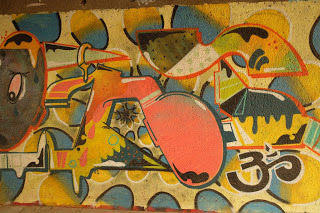
I'm a little out of my depth when it comes to street art. I've come to it a little late in the game (and in my life) and I'm still not sure if I understand it entirely. That being said, it still interests me, and one doesn't have to be an expert to enjoy something on a deeper level.
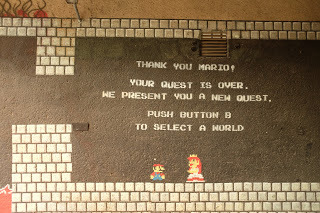
Of course, I'm not entirely sure why it has so captured my imagination. I sense that unlike gallery art (still something I enjoy[1]), street art usually tries to say something about life or politics. And in that sense, street art is a little crude—just the potion for me. Yet even for the more ambiguous works, there's something to be said for art that everyone can access. Not having to pay for it, or enter a stuffy art gallery, does a lot for any piece of art. [2]

But again, I prefer the kind that says something. Thus I like Banksy, or the above one that uses math functions in a clever way [3]. I mentioned that I came to like street art only lately. Like most people in the middle class, I associated graffiti with urban decay. Now I see it as a statement that represents the people in the neighborhood. A snapshot of a part of the zeitgeist. So even though I want something worthwhile over scrawls—or even the other end of the spectrum: the mural as representing social happiness [4]—I understand that even a few sprays can mean something as well. To want to white wash that is to want to silence speech. [5]
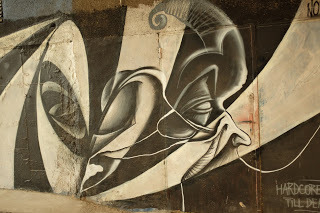
But I digress. As a writer I am coming to grips with graffiti as character. Since it can speak to the alienation of an individual(s), to the zeitgeist, then it should grow in an arc and help the landscapes I create breathe. I did this in Labyrinth; I hope to improve upon it in the future.
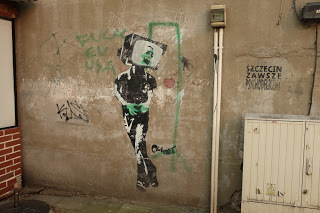
In the meantime, I walk through streets and past train cars as if I were in a gallery. Here in Spokane the walls are bland, but there's hope in the horizon. For example some train cars can be beautiful. I hope to add them here, and soon. These pictures (save the math one) are all from Szczecin, Poland. What are your thoughts on graffiti?
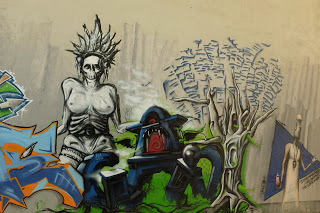
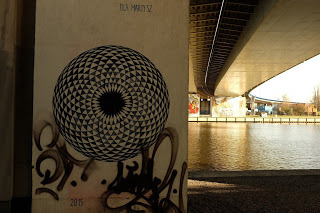
[1] Well, with contemporary art—the obvious counterpart to street art—I find it a miss or hit affair with the former representing the vast majority of the cases. That ambiguity that art critics enjoy is not something I care for. A peasant's complaint, I know.
[2] Again, we can get into the definition of art, but I'd rather not go down that rabbit hole.
[3] I mentioned this in a previous piece of Art is Life; artists using math functions or algorithms to guide their brushes...
[4] Almost communist, if you ask me.
[5] Oh, I know, protect property and all that, but that need to silence, is still something I hate. Not to say I am a saint—I would be just as angry if someone spray painted my car—it's just something to be wary of. I look around many cities and I think of their bland walls as almost—again that word—communist in their oppression.
Good writing, huh? Share it via email, facebook, twitter, or one of the buttons below (or through some other method you prefer). Thank you! As always, here's the tip jar. Throw some change in there and help cover the costs of running this damn thing
 Donate Bitcoins
Donate Bitcoins 
Published on April 16, 2016 23:30
Chuck and "One man can only know a drop in the ocean of knowledge"
It was a typical early summer night in Alaska. The sun was stubborn in its descent and a dull light lingered in the sky for a little too long. The just awakening land reeked of fresh pine and dirt and beer and the hum of mosquitoes, which, with their piercing whines, let us know of our value as pieces of meat.
We had gathered around a campfire, an eclectic mix on construction workers, foreign resort workers and hippies and stragglers. Though not entirely true for the developed area we lived in, Alaska was in many respects still a last frontier. Certainly, with regard to perception it was one; people still flocked to it to find solace from demons back in the lower 48.
Not that I'm trying to make the place seem wild... Nevertheless, there were the usual suspects there: those low-level criminals with one too many warrants back home; or those with families filled with the troubles of drugs or fists; or others just trying to earn enough for a dream-life—or rather to stay afloat in a nightmare-life.
There was some initial honeymoon moment, at the fire, when everyone seemed to be getting along; the construction workers allowed a few resort workers to drive their 4-wheelers and the talk was jovial and laced with laughter. Then the construction workers seemed to grow angry with everyone—especially the hippies.
I just stood back and observed, trying to limit my drinking, as I felt the presence of the nearby mountains and the roaring Nenana river. Melancholy was, and is, my vice, though I suppose it has matured into a more palatable drink these days. Almost something I can enjoy, now. Then, however, it meant corralling thoughts then wondering what to do with them.
It was at this point that one of the construction workers came up to talk to me. I'm not sure why, as their segregation from the rest of us was nearly complete and the others were, for reasons unknown to me, acting fairly scared of them.
He introduced himself as Chuck. He was the most introspective of the lot, so I was more than willing to partake in a conversation with him. I'm not sure what exactly we talked about in all that time, or what points the conversation grew out into tangents, as such conversations normally tend to do, but at some point the conversation did swing to the merits of traveling and the people that one met.
Chuck, as it were, was a poet. No, I doubt that he penned much, though if he did it must have been in secrecy from his fellow construction workers. No, he spoke as one. He said that we were all like streams, traveling through this life, and that each time we get to know someone, even briefly, we take something from them, and them from us, and that changes the composition and direction of both streams.
Beautiful, I thought then. Not that I don't think it's beautiful now, just that one can grow weary of such easy models of the world. I think of that visualization of streams racing through the air, and it still resonates with me.
Of course, now older, I have met too many people to think there is much of a change when one meets others. This doesn't render Chuck's model wrong, it just makes me more of an asshole than I previously thought.
That's not the point, though. The point is back then I had no philosophy for myself or model for the world, so I'd take pieces of advice, comments about the world from my parents, relatives, teachers, books and various news sources [1]
Thus anything that presented itself with a modicum of sagacity was absorbed with great enthusiasm by me. I thought it wise to cast a wide net. I think I told myself something about multiple data points over a large range, and set forth in gathering that. I also believed myself to be truly free of all tribal ties [2] and thus I believed myself a clear conduit for all these ideas.
I suppose this would be better called "youth", but I believed it and took advice from all concerned [3], never once taking much effort to evaluate my own station—at a solidly middle class estate in the middle of an Empire—and the viewpoints that this station would allow. [4]
Now, however, the internets having thoroughly destroyed all previous walls of any pretension against the idea that we were truly in a post-modern world (and a tribal one at that), I wonder what to make of my youthful desire to hear all opinions in shaping my world. I wonder, too, whether my world has been shaped, if I have a model for it and finally if I have even a philosophy for myself or for the post-modern human being in the that world model of mine.
And even though the strains of tribalism and postmodernism are now very apparent everywhere in the world, it wasn't true then (even if I knew it existed, sensed it and only decided to accept the status quo answers after much deliberation). Now, I still find myself floundering for full answers and full models of the world. Few others seem to have the answers and so it's up to me, I suppose.
But even there I see a weakness.
For example, back then I thought that merely basing one's life on all the scientific evidence available and disregarding all tribal (and religious) pulls was paramount to being a modern civilized human. [5] Now, however, I see how silly that was. Never mind the little bits of evidence I did accumulate. I was still enthralled to tribal allegiances, I just didn't know it. And even if it was wrapped in a flag, that makes me a dupe.
And now? Still gathering evidence, still making my house on supposed rock, but I know why people choose tribal or religious allegiances over "higher" ones. It is a matter of power and helplessness. And so I work to inform, to compare, hoping to come up with an answer, for I don't see any around.
And yet here I struggle on with my philosophy: base it on evidence and love of your fellow human (i.e. the proper building of such relations) and a utilization of maximum happiness.
Seems simple, maybe even cute, but not so easy to do in a world full of chopped heads and mangled or liquified corpses. Oh, I know the answers to that: to forget what power does in our name and to remember to make something good haven for ourselves alone. But I refuse that and wish to do more than that.
Foolish?
Probably. Perhaps, then, I should include fate in my philosophical world model. A far cry from that moment by the Nenana river.
As for Chuck, I wonder what he's up to and if he held on to so beautiful a vision of the world.
[1] I thought myself oh so much better than my peers for having read the Economist for more than a decade at that point (to give you the idea of my hubris)
[2] Though I sense that I was still of the nationalist mainframe, whatever that may mean to you... I can get into the details of what that meant to me later. I suppose it was mixed in with some sense of being cosmopolitan as well.
[3] Not to say that there was no filter
[4] I know now that I dug in too deeply, but was too easily willing to take the weak answers in favor of the status quo as authoritative on the matter. Convenient for me, of course.
[5] Again, with love of country and all that. I was aware then of the constraints that the nation-state placed on humanism.
Good writing, huh? Share it via email, facebook, twitter, or one of the buttons below (or through some other method you prefer). Thank you! As always, here's the tip jar. Throw some change in there and help cover the costs of running this damn thing Donate Bitcoins
Donate Bitcoins 
We had gathered around a campfire, an eclectic mix on construction workers, foreign resort workers and hippies and stragglers. Though not entirely true for the developed area we lived in, Alaska was in many respects still a last frontier. Certainly, with regard to perception it was one; people still flocked to it to find solace from demons back in the lower 48.
Not that I'm trying to make the place seem wild... Nevertheless, there were the usual suspects there: those low-level criminals with one too many warrants back home; or those with families filled with the troubles of drugs or fists; or others just trying to earn enough for a dream-life—or rather to stay afloat in a nightmare-life.
There was some initial honeymoon moment, at the fire, when everyone seemed to be getting along; the construction workers allowed a few resort workers to drive their 4-wheelers and the talk was jovial and laced with laughter. Then the construction workers seemed to grow angry with everyone—especially the hippies.
I just stood back and observed, trying to limit my drinking, as I felt the presence of the nearby mountains and the roaring Nenana river. Melancholy was, and is, my vice, though I suppose it has matured into a more palatable drink these days. Almost something I can enjoy, now. Then, however, it meant corralling thoughts then wondering what to do with them.
It was at this point that one of the construction workers came up to talk to me. I'm not sure why, as their segregation from the rest of us was nearly complete and the others were, for reasons unknown to me, acting fairly scared of them.
He introduced himself as Chuck. He was the most introspective of the lot, so I was more than willing to partake in a conversation with him. I'm not sure what exactly we talked about in all that time, or what points the conversation grew out into tangents, as such conversations normally tend to do, but at some point the conversation did swing to the merits of traveling and the people that one met.
Chuck, as it were, was a poet. No, I doubt that he penned much, though if he did it must have been in secrecy from his fellow construction workers. No, he spoke as one. He said that we were all like streams, traveling through this life, and that each time we get to know someone, even briefly, we take something from them, and them from us, and that changes the composition and direction of both streams.
Beautiful, I thought then. Not that I don't think it's beautiful now, just that one can grow weary of such easy models of the world. I think of that visualization of streams racing through the air, and it still resonates with me.
Of course, now older, I have met too many people to think there is much of a change when one meets others. This doesn't render Chuck's model wrong, it just makes me more of an asshole than I previously thought.
That's not the point, though. The point is back then I had no philosophy for myself or model for the world, so I'd take pieces of advice, comments about the world from my parents, relatives, teachers, books and various news sources [1]
Thus anything that presented itself with a modicum of sagacity was absorbed with great enthusiasm by me. I thought it wise to cast a wide net. I think I told myself something about multiple data points over a large range, and set forth in gathering that. I also believed myself to be truly free of all tribal ties [2] and thus I believed myself a clear conduit for all these ideas.
I suppose this would be better called "youth", but I believed it and took advice from all concerned [3], never once taking much effort to evaluate my own station—at a solidly middle class estate in the middle of an Empire—and the viewpoints that this station would allow. [4]
Now, however, the internets having thoroughly destroyed all previous walls of any pretension against the idea that we were truly in a post-modern world (and a tribal one at that), I wonder what to make of my youthful desire to hear all opinions in shaping my world. I wonder, too, whether my world has been shaped, if I have a model for it and finally if I have even a philosophy for myself or for the post-modern human being in the that world model of mine.
And even though the strains of tribalism and postmodernism are now very apparent everywhere in the world, it wasn't true then (even if I knew it existed, sensed it and only decided to accept the status quo answers after much deliberation). Now, I still find myself floundering for full answers and full models of the world. Few others seem to have the answers and so it's up to me, I suppose.
But even there I see a weakness.
For example, back then I thought that merely basing one's life on all the scientific evidence available and disregarding all tribal (and religious) pulls was paramount to being a modern civilized human. [5] Now, however, I see how silly that was. Never mind the little bits of evidence I did accumulate. I was still enthralled to tribal allegiances, I just didn't know it. And even if it was wrapped in a flag, that makes me a dupe.
And now? Still gathering evidence, still making my house on supposed rock, but I know why people choose tribal or religious allegiances over "higher" ones. It is a matter of power and helplessness. And so I work to inform, to compare, hoping to come up with an answer, for I don't see any around.
And yet here I struggle on with my philosophy: base it on evidence and love of your fellow human (i.e. the proper building of such relations) and a utilization of maximum happiness.
Seems simple, maybe even cute, but not so easy to do in a world full of chopped heads and mangled or liquified corpses. Oh, I know the answers to that: to forget what power does in our name and to remember to make something good haven for ourselves alone. But I refuse that and wish to do more than that.
Foolish?
Probably. Perhaps, then, I should include fate in my philosophical world model. A far cry from that moment by the Nenana river.
As for Chuck, I wonder what he's up to and if he held on to so beautiful a vision of the world.
[1] I thought myself oh so much better than my peers for having read the Economist for more than a decade at that point (to give you the idea of my hubris)
[2] Though I sense that I was still of the nationalist mainframe, whatever that may mean to you... I can get into the details of what that meant to me later. I suppose it was mixed in with some sense of being cosmopolitan as well.
[3] Not to say that there was no filter
[4] I know now that I dug in too deeply, but was too easily willing to take the weak answers in favor of the status quo as authoritative on the matter. Convenient for me, of course.
[5] Again, with love of country and all that. I was aware then of the constraints that the nation-state placed on humanism.
Good writing, huh? Share it via email, facebook, twitter, or one of the buttons below (or through some other method you prefer). Thank you! As always, here's the tip jar. Throw some change in there and help cover the costs of running this damn thing
 Donate Bitcoins
Donate Bitcoins 
Published on April 16, 2016 11:00
April 15, 2016
More in the Air
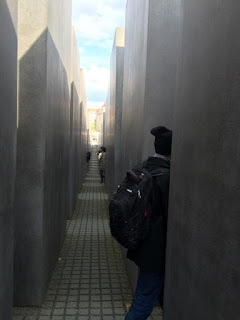 Holocaust Memorial in Berlin
Holocaust Memorial in BerlinA quick aside, on my recent trip abroad to Poland (Szczecin) and Berlin. My trip before was filled with people talking about Putin and his Russian moves. It's interesting for me, one against an expansionist foreign policy, to hear people talk of Russia as up to its old antics again. The fear was real, and it wasn't based on nothing. In fact, back then, with Russia and Germany talking alone, people were very certain that there was some geo-politcal power-play going on, and the minnows would not be included (as per history).
[2]
Again, history hung heavy in the air. I was told a series of stories about refugees and their misconduct. Fair enough. They mentioned WWII, saying that things were going too far in the other direction. I, of course, was silent as I absorbed this all. I think now that I want to know which aspect of WWII were they talking about? The fear of Bolsheviks? Again, I'm not dismissing anyone's views. If you read my blog, you will know that I think that any citizen of a democracy (especially one that espouses free speech) should never work to silence others, no matter how abhorrent. [3]
Later in Berlin, I managed to see the Holocaust memorials for those who were murdered during WWII. I'm not sure why, but I fought back tears. I think I mentioned earlier how I've argued with plenty of people (Europeans) over the Roma issue and how people seemed so willing to dismiss them, to want to erase them (well deport them for not being socially worthwhile, same vein, if you ask me).
Now, I'm not so simple as to think that just because a thought is in the same vein as another, they are the same. Or the person who thinks of one is damn near guilty of the other. We are apes, and so heuristics don't always work in that fashion. (I speak of the slippery slope fashion and so forth, which don't always seem to be based on human nature). There can be lines drawn on an issue and we usually stick to them. But I speak of apes, still, and thus we must always be vigilant.
And I'm worried too, because I don't think that Europe will handle the influx of refugees very well. This is not an accusation, but an observation. And again, it doesn't take evil for evil acts to come about. Good intentions and self-preservation can do quite a bit of damage on their own.
But we need some sort of solution to this, to the refugees and assimilating people to a culture, to say nothing of justice on a global scale, otherwise the future will not look kindly upon us. Any of us.
[1] With our own role in it, and the fascist aspects of the uprising much too hidden even to this day. But that's the mainstream media, and I don't expect much from courtiers.
[2] These weren't extremists I was hanging out with. These were normal everyday people, and I would say all of them were better human beings (kinder, more empathetic) than I. One huge issue was the current leadership in Poland (to include the Church) was becoming too reactionary on several matters and that they were trying too hard to provoke Russia. No one was a fan of this, but somehow the said politicians had a following (and, as I said, the Church's backing which was powerful). So then, people did care about such a reactionary turn. Not extremists, as I said.
[3] Let me state again that proponents of Godwin's Law, or those who seem to use it to bludgeon others into silence when they bring up Nazis or WWII, are simply foolish. WWII still hangs heavy in the air of even our nation and to dismiss attempts to tie it in to the present day are an attempt to forget that dark hour (many other dark hours too, I suppose, a nightmare from which we may never awake).
Good writing, huh? Share it via email, facebook, twitter, or one of the buttons below (or through some other method you prefer). Thank you! As always, here's the tip jar. Throw some change in there and help cover the costs of running this damn thing
 Donate Bitcoins
Donate Bitcoins 
Published on April 15, 2016 11:13
April 14, 2016
On Writing: the Muse
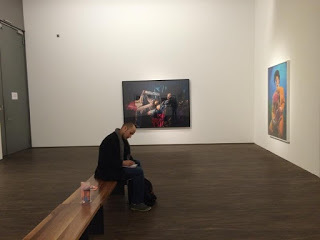 me writing at a Cindy Sherman Exhibit The city of Berlin can now consider itself a place that cogitated much thought from my brain and teased much writing from my fingers. Again, I'm not sure why, but the cafes and museums certainly didn't hurt. And though I have talked about it before, I do sometimes wonder what it is that causes such a burst of writing. Still shorts, these—mind you—but some are becoming quite original.
me writing at a Cindy Sherman Exhibit The city of Berlin can now consider itself a place that cogitated much thought from my brain and teased much writing from my fingers. Again, I'm not sure why, but the cafes and museums certainly didn't hurt. And though I have talked about it before, I do sometimes wonder what it is that causes such a burst of writing. Still shorts, these—mind you—but some are becoming quite original. 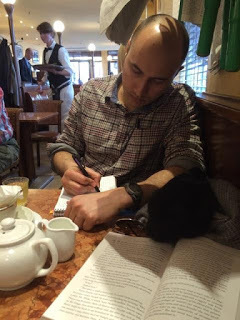 Me Writing in Einstein Cafe
Me Writing in Einstein CafeI would even point out that the weather wasn't the greatest. And yet it worked. I almost couldn't find enough time to write. A good feeling, and perhaps I should leave it at that. But with creativity, and how one can harness it, being all the rage, let me add at least a case study to the matter.
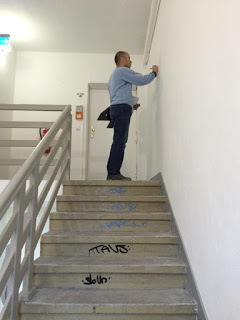 Pretending to add to the plethora of tagging. I actually couldn't think of what to sayTraveling itself, to a new place, can always spark the mind and cause it to make new connections and thus start new stories. But this isn't always the case [1]. No, this time it was certainly the city itself. The fact that it was partially gentrifying amidst the graffiti and the decaying ruins of communist-drab cement buildings certainly had something to do with it, but it wasn't just that. The city itself seemed very certain of itself, seemed to know exactly what it was about. Its inhabitants too. And me, some random moron scribbling away in a cafe didn't matter to it or any of the people around. And true to their attitude, I failed a crucial test. At a moment, when I could have joined the (seemingly) million other taggers, my mind blanked and couldn't come up with anything. And so I didn't write (but I did pose like I did. A very bourgeoisie thing to do, or at leas tperfect for the Facebook world of images). That in itself is worthy of analysis. Why was writing on a wall suddenly so different than writing on paper? The permanency of the act? I suppose that when I write it's all about knowing that it will be edited, corrected. You know, Michelangelo chipping away at the marble trying to get his sculpture and all that. But is that it? Was it also my middle class sensibilities coming out and decrying the desecration of a wall? (even if I know that doesn't make sense?) Hard to say, though I would like to hear what the real taggers have to say. I imagine that one needs to go out with a premade fabrication (even if it's just the thought or idea), otherwise one won't have the time to do much. I also didn't see any stories written out. The wrong medium? I think not. But perhaps someone out there can put up one of these stories and see what comes of it. [2] I do hope to go back, of course. This time with a paint pen. My next stories will have to be short and succinct enough to be scrawled on their walls. And you? You ever tag? How about a story?
Pretending to add to the plethora of tagging. I actually couldn't think of what to sayTraveling itself, to a new place, can always spark the mind and cause it to make new connections and thus start new stories. But this isn't always the case [1]. No, this time it was certainly the city itself. The fact that it was partially gentrifying amidst the graffiti and the decaying ruins of communist-drab cement buildings certainly had something to do with it, but it wasn't just that. The city itself seemed very certain of itself, seemed to know exactly what it was about. Its inhabitants too. And me, some random moron scribbling away in a cafe didn't matter to it or any of the people around. And true to their attitude, I failed a crucial test. At a moment, when I could have joined the (seemingly) million other taggers, my mind blanked and couldn't come up with anything. And so I didn't write (but I did pose like I did. A very bourgeoisie thing to do, or at leas tperfect for the Facebook world of images). That in itself is worthy of analysis. Why was writing on a wall suddenly so different than writing on paper? The permanency of the act? I suppose that when I write it's all about knowing that it will be edited, corrected. You know, Michelangelo chipping away at the marble trying to get his sculpture and all that. But is that it? Was it also my middle class sensibilities coming out and decrying the desecration of a wall? (even if I know that doesn't make sense?) Hard to say, though I would like to hear what the real taggers have to say. I imagine that one needs to go out with a premade fabrication (even if it's just the thought or idea), otherwise one won't have the time to do much. I also didn't see any stories written out. The wrong medium? I think not. But perhaps someone out there can put up one of these stories and see what comes of it. [2] I do hope to go back, of course. This time with a paint pen. My next stories will have to be short and succinct enough to be scrawled on their walls. And you? You ever tag? How about a story?[1] The only time it works is if I feel trapped in a place, then simply the movement itself can effect some change.
[2] That alone is enough to cause me to think of a myriad of ways to come up with tagging stories, or different parts of stories all over the city. Perhaps it's the best medium for graphic tales to be told? Or picture book kind of tales? I'm afraid I don't have the talent for the painting, but I can stick figure my way through it.
Good writing, huh? Share it via email, facebook, twitter, or one of the buttons below (or through some other method you prefer). Thank you! As always, here's the tip jar. Throw some change in there and help cover the costs of running this damn thing
 Donate Bitcoins
Donate Bitcoins 
Published on April 14, 2016 10:46
April 13, 2016
Back from Poland and Berlin
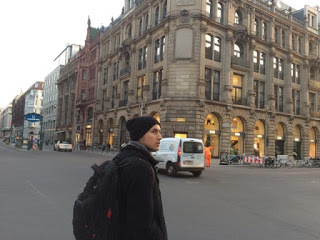 Me in Berlin
Me in BerlinWell, a death in the family had me flying out to Europe. Poland, specifically, then Berlin for a couple of days. This will be something of a scattershot of topics. Dealing with the death of another grandparent produced enough melancholy that I wondered why there were not more moments of remembrance. What I mean is that there weren't enough stories about the deceased, and even though everyone else was closer to said person than I, I couldn't shake that feeling. The person, if you didn't guess, was the grandfather of my better half.
That I, a writer, should want stories told might seem a little uncaring, but I felt the same thing after the death of my own grandfather (the only one I ever knew). Rituals were had, but none included the retelling of stories past. This has happened for other deaths too, and I'm still at a loss for why. I'm not saying that each person at a viewing or funeral cannot go through their own thoughts about the matter, but this still felt like a missed opportunity.
Why is that? Why do the rituals surrounding death seem so silent? [1] Is it merely the result of us urban post-modern humans not having an all out ritual? Perhaps sharing those stories is hard? I'm not sure, but I want that incorporated in my funeral at least: share the good and bad stories. Drink something. Remember, because soon everyone will forget.
On that note, before the funeral, I was lucky enough to see the hometown of my beloved, Szczecin. A larger town than I remember, we were able to see a few pieces of art in a local gallery. I even managed to write.
Afterwards, the background melancholy still high, we visited Berlin for a couple of days (it was the place where we flew in and out). I'm not sure I've loved a city more. Berlin was, simply put, gorgeous. The museums and the mix of dilapidated and new buildings really seemed to strike a chord with me. That and the cafes. And the food as discovery, when we finally found a restaurant in a maze of alleys and unmarked doors. And the simple air of it all. Or perhaps it was a matter of the specter of its history, so dark and so recent.
Nevertheless, I managed to write quite a bit and I hope that you will be somewhat entertained by the stories I penned out. Soon to be seen in the email list, so sign up.
[1] For the moment I won't digress into my time in the Army. And more specifically, in 5th SFG, where all are required to ensure that their wills and funeral rituals are in place (usually in terms of a song etc). There if one were to request a song that was out of place, "Super Freak" or what have you, it would be rudely shut down. A missed opportunity perhaps? So then, at risk of seeming so insensitive, I speak of my own funeral.
Good writing, huh? Share it via email, facebook, twitter, or one of the buttons below (or through some other method you prefer). Thank you! As always, here's the tip jar. Throw some change in there and help cover the costs of running this damn thing
 Donate Bitcoins
Donate Bitcoins 
Published on April 13, 2016 10:45
April 11, 2016
American Werewolf in London
I just watched
American Werewolf in London
and wasn't too impressed. The movie reminded me of an ancient story in these parts. I've heard different variations and thus different attributions: some to settlers, others to the Natives. Appropriation aside, I'll try to present the story as neutrally as I can:
They summon the monster from within the man by making him angry. And yet the man hates this mutation of his. And when he's a human he begs them to let him be. But they still do it and release him into the forests to hunt down the beasts. Thing is, sometimes he hunts some of the villagers, but this doesn't compare to the death and destruction that happened before, when the beasts could run amok.
And that's the end of the story. The village once on the verge of extinction is now doing well and burning the forest where they can. The man is kept in chains and is released when needed, though that's not very often.
I'm told that this story is either a derivative or original of the werewolf legend. I'm not sure why I didn't like the movie more. American Werewolf in London has enough introspection, theories on death and self-sacrifice and our baser instincts to at least say something about the human condition, and the story I just wrote down doesn't seem to say much at all.
And despite all that, I like it more. This could say something about me, about how I like the known unknowns in a story over the tried and true known knowns. I'm still an ape, I suppose, but still trying to differentiate myself? I hope not.
Good writing, huh? Share it via email, facebook, twitter, or one of the buttons below (or through some other method you prefer). Thank you! As always, here's the tip jar. Throw some change in there and help cover the costs of running this damn thing Donate Bitcoins
Donate Bitcoins 
They summon the monster from within the man by making him angry. And yet the man hates this mutation of his. And when he's a human he begs them to let him be. But they still do it and release him into the forests to hunt down the beasts. Thing is, sometimes he hunts some of the villagers, but this doesn't compare to the death and destruction that happened before, when the beasts could run amok.
And that's the end of the story. The village once on the verge of extinction is now doing well and burning the forest where they can. The man is kept in chains and is released when needed, though that's not very often.
I'm told that this story is either a derivative or original of the werewolf legend. I'm not sure why I didn't like the movie more. American Werewolf in London has enough introspection, theories on death and self-sacrifice and our baser instincts to at least say something about the human condition, and the story I just wrote down doesn't seem to say much at all.
And despite all that, I like it more. This could say something about me, about how I like the known unknowns in a story over the tried and true known knowns. I'm still an ape, I suppose, but still trying to differentiate myself? I hope not.
Good writing, huh? Share it via email, facebook, twitter, or one of the buttons below (or through some other method you prefer). Thank you! As always, here's the tip jar. Throw some change in there and help cover the costs of running this damn thing
 Donate Bitcoins
Donate Bitcoins 
Published on April 11, 2016 11:41
April 10, 2016
Five Short Story Writers You Must Read
Was having lunch with my better half and I was asked who were my favorite short story writers. Besides Borges, of course. Yes, she knows about my love for that writer as well. But, when I tried to think about my favorite short story writers, I had to add so many qualifications that it rendered such a list worthless. Same went for any specific books I wanted to pick. [1]
There has also been a change in me as writer . I'm writing more short stories than ever . And I'm trying to include as much as possible in my short stories as I can. Thus stories that seem to be crafted in an MFA workshop and are much ado about nothing, really rub me the wrong way.
So authors like Munro , Trevor , Adichie, GMG and DFW , though they write very well, and write some beautiful stories, don't fit the bill anymore. There are a few others with a more experimental vibe that I think I like, but wouldn't consider them as greats. In this realm I include the likes of Cortazar , and Bolano. Nevertheless, even if I wouldn't pick them, I recommend you check them out.
Here, then, is the list:
1) Borges, Borges, Borges. You can't go wrong with any book of his, though Ficciones is my favorite. (Also good are Aleph , and Universal History of Iniquity .)
[image error] [image error]
2) Flannery O Connor 's a Good Man is Hard to Find . Even though I don't like many who now write like her, she is the original and thus worthy of this list.
3) Solzhenitsyn is a surprise entry here. I bought this book off a bargain table and was in love. A great one to read, though keep a bottle of Scotch nearby. Apricot Jam & Other Stories .
4) Calvino's Difficult Loves has a large selection of his stories, but they're all worthwhile (see his Italian Folktales below).
5) Iraqi Christ by Blasim is a still the best book to come out of that dreadful war (yet). Fantastical and macabre, I'm not sure when I've been so riveted by short stories. Seriously some of the best stories out there, and you should read it as soon as you can.
(I think you can get a more comprehensive selection of his stories here).
There it is, what do you think? I should note that collections I love have not been included here. You should certainly consider the following: The Tongue's Blood does not Run Dry: Algerian Stories . And my personal favorite Italian Folktales . Read these, as they are nothing short of amazing.
I would also say that I've yet to read all that there is to be read and that the likes of Ursula and Vonnegut I have not explored enough to say yes or no to (even if I sense it will be a yes). And a final note is that I have not included the greats, like Chekhov or Gogol, but you should still read those too.
[1] For now I'll stay away from picking single stories, for I think Borges will come out dominating that list.
[2] I mentioned that in my classic literature post, where the propensity of a book to be reread is what marks it as a great book.
Good writing, huh? Share it via email, facebook, twitter, or one of the buttons below (or through some other method you prefer). Thank you! As always, here's the tip jar. Throw some change in there and help cover the costs of running this damn thing Donate Bitcoins
Donate Bitcoins 
There has also been a change in me as writer . I'm writing more short stories than ever . And I'm trying to include as much as possible in my short stories as I can. Thus stories that seem to be crafted in an MFA workshop and are much ado about nothing, really rub me the wrong way.
So authors like Munro , Trevor , Adichie, GMG and DFW , though they write very well, and write some beautiful stories, don't fit the bill anymore. There are a few others with a more experimental vibe that I think I like, but wouldn't consider them as greats. In this realm I include the likes of Cortazar , and Bolano. Nevertheless, even if I wouldn't pick them, I recommend you check them out.
Here, then, is the list:
1) Borges, Borges, Borges. You can't go wrong with any book of his, though Ficciones is my favorite. (Also good are Aleph , and Universal History of Iniquity .)
[image error] [image error]
2) Flannery O Connor 's a Good Man is Hard to Find . Even though I don't like many who now write like her, she is the original and thus worthy of this list.
3) Solzhenitsyn is a surprise entry here. I bought this book off a bargain table and was in love. A great one to read, though keep a bottle of Scotch nearby. Apricot Jam & Other Stories .
4) Calvino's Difficult Loves has a large selection of his stories, but they're all worthwhile (see his Italian Folktales below).
5) Iraqi Christ by Blasim is a still the best book to come out of that dreadful war (yet). Fantastical and macabre, I'm not sure when I've been so riveted by short stories. Seriously some of the best stories out there, and you should read it as soon as you can.
(I think you can get a more comprehensive selection of his stories here).
There it is, what do you think? I should note that collections I love have not been included here. You should certainly consider the following: The Tongue's Blood does not Run Dry: Algerian Stories . And my personal favorite Italian Folktales . Read these, as they are nothing short of amazing.
I would also say that I've yet to read all that there is to be read and that the likes of Ursula and Vonnegut I have not explored enough to say yes or no to (even if I sense it will be a yes). And a final note is that I have not included the greats, like Chekhov or Gogol, but you should still read those too.
[1] For now I'll stay away from picking single stories, for I think Borges will come out dominating that list.
[2] I mentioned that in my classic literature post, where the propensity of a book to be reread is what marks it as a great book.
Good writing, huh? Share it via email, facebook, twitter, or one of the buttons below (or through some other method you prefer). Thank you! As always, here's the tip jar. Throw some change in there and help cover the costs of running this damn thing
 Donate Bitcoins
Donate Bitcoins 
Published on April 10, 2016 15:00
Nelson Lowhim's Blog
- Nelson Lowhim's profile
- 14 followers
Nelson Lowhim isn't a Goodreads Author
(yet),
but they
do have a blog,
so here are some recent posts imported from
their feed.



